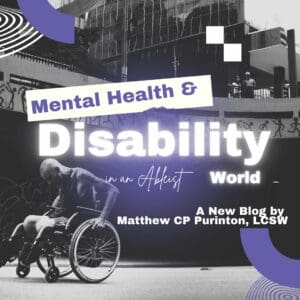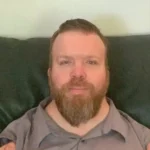Mental Health and Disability in an Ableist World
CFR Staff Therapist and advocate Matthew CP Purinton, LCSW, explores the relationship between mental health and disability, the urgency of disability justice, and the often-overlooked role of the crip doula in supporting identity and healing.
How Mental Health and Disability Intersect Beyond Assumptions
According to the CDC, Disabled adults are almost five times as likely to report mental distress than non-Disabled people. However, the reason is not necessarily what society would assume. The Disabled, on average, report an equal quality of life to non-Disabled people. This flies in the face of the idea of the “pitiful cripple”—the belief that a Disabled person is better off dead.
The assumption is that being disabled must be so horrible that it causes mental anguish. When we talk about mental health and disability, it’s critical to look beyond stereotypes and assumptions. Being Disabled is a valid and necessary existence. For many Disabled people, ableism and inaccessibility are most likely to cause mental distress.
There is an assumption in society that being Disabled isn’t a valid existence. It is difficult for many non-disabled people to understand how a Disabled person can feel truly thankful for their disability, and for being part of the Disability Community. Living with a disability in a social sphere that views the Disabled as “invalids” brings with it acute stress.
Navigating a world not designed for one’s body requires hyper-vigilance. These survival mechanisms have a cost. Incorporating a disability into one’s identity isn’t an easy or quick process. It is a process repeated at each stage of life. It is a process that begins with avoidance and denial but has the potential to progress to acceptance and love.
Mental Health and Disability Within the Context of Identity
Disability is not one-size-fits-all. It shows up differently for every person and intersects with many other parts of life and identity. For many, recognizing Disability as part of who they are is an ongoing—and sometimes painful—process. At its core, disability justice calls us to honor that complexity, rather than internalize the stigmas engrained in society that scars psyches. Self-love is an act of Disability Justice.
Disability Is Diverse and Intersectional
It is difficult to write about the mental health of Disabled people because the Disability Community is so large and so diverse. Twenty-seven percent of adults in the United States are Disabled. Over one billion people worldwide are Disabled.
If you know one Disabled person, you know one Disabled person. This complexity is expressed in the variability in the process of disability identity integration.
Disability is both an intersectional and interactional experience. A person is Disabled along with their other identities. Mental health and disability are shaped not just by personal experiences, but by cultural and systemic forces. Disability is a transnational community, united by the way we move through the world. It is the lived experience of being disabled.
Inequity in Access Deepens the Divide
At one point in my life, I avoided being around other disabled people. I attempted to “pass.” I avoided asking for help when I needed it. Later, I developed pride in being disabled and being a member of the Disability Community. Over time, my disability shaped my experiences and my path through life. I realized that without that journey, I wouldn’t be me.
This process of self-acceptance with a disability often extends to romantic relationships. Sometimes, people try to talk prospective partners out of being attracted to them. However, it can progress to understanding that a disability is something to be navigated in a romantic relationship, along with many other facets of each partner.
This process can be complicated by the model of Disability that one has internalized. Developing an integrated identity that includes Disability is a long process—one that Disabled people too often navigate without the help of a “crip doula.”
Many are unaware of what crip doulas are and the critical role they play. A crip doula is a Disabled person who guides a newly Disabled person into the Disability Community. The role of a crip doula is especially important in a world where traditional therapy and medical systems often fail to support Disability identity development.
How Society Responds to Disability
How society treats Disabled people says a lot about our culture. From employment to health care to community access, society often sends the message that disabled lives are less valuable. The truth is that society has always relied on the unique and needed contributions of disabled folx.
If everyone in the world had my disability, it would no longer be a disability because the built world and the social sphere would be designed for people who move through the world as I do. Utilizing universal design is the next best thing. It reduces barriers for everyone. When disabled people inhabit accessible spaces with community supports, it saves taxpayers money, and keeps people connected to their community.
How Inaccessibility Shapes Mental Health and Disability Outcomes
A coal miner, for instance, could experience an injury that prevents them from working. If that same person had developed that Disability and worked in an office, it’s possible they could return to work. If their environment is accessible, they might not feel the stress of confronting an inaccessible world to the same degree.
Disability is tricky that way—its real-world challenges can change from place to place or as one ages.
Within every demographic group, there is a subpopulation that’s Disabled. This subgroup is the most marginalized group of the greater group. Disability Justice requires us to recognize and respond to that marginalization, especially when it exists within other historically excluded communities. These overlapping identities further complicate how mental health and disability intersect, often creating barriers to support and care.
COVID and the Devaluation of Disabled Lives
The COVID-19 pandemic brought the harsh realities of ableism into sharp focus. For many Disabled people, it was not just a public health crisis—it was a political and existential one.
COVID was and is an existential threat to disabled people. We witnessed systems that had always been a support, fail us.
During the COVID pandemic, Pennsylvania attempted to enact crisis standards of care. These would have allowed the state to go into the homes of Disabled and elderly people and take their ventilators to use on non-Disabled people—killing the Disabled users in their beds.
Enacting crisis standards of care would also have allowed the state to refuse to send paramedics to the home of a child in distress, simply because they carried the label “Disabled.” The Supreme Court struck this down as unconstitutional. This is something that’s difficult to deal with. It is only by remembering that it was the Disabled and non-disabled who worked together to get the standards struck down that I feel comfortable being in Pennsylvania to this day.
During the worst of COVID, Disabled people heard health leaders in government say that it was fortunate the majority of deaths were happening to Disabled people. It was bone-chilling to hear elected leaders parrot age old inaccuracies that being Disabled must be a life unlivable. We witnessed legislation long settled and hard won recede.
Threats to Disability Rights
For generations, laws like IDEA, Section 504, and the ADA (Americans with Disabilities Act) have protected Disabled people’s rights to education, employment, and access. These hard-won protections are now under threat.
Laws like IDEA, Section 504, and the ADA—the laws that equipped generations of the Disabled to experience nature in federal parks and pursue education and employment—are all being challenged. The world that many Disabled people have known is shrinking before us. That shrinking world is exactly what Disability Justice seeks to resist—through access, dignity, and community support. When legal protections erode, the relationship between mental health and disability becomes even more precarious.
I remember, as a young child sitting in a wheelchair at a curb outside the Children’s Hospital of Philadelphia, there were no curb cuts. Before the ADA was passed, a city block was like an island of cement in a sea of asphalt. I couldn’t travel a single block in my wheelchair without help.
How can the hard work of so many generations of Disabled advocates be washed away? Without meaningful support—from systems, communities, or even a crip doula—too many are left to face these losses alone.
Losing one’s freedom is not something Americans are prepared for.
Holding Power in a World That Overlooks Mental Health and Disability
Even as systems continue to fail us, the Disability Community holds strength, resilience, and brilliance. We must engage in the process of disability identity integration and adopt a Disability Justice framework guided by core principles. The value of every life is equal, intrinsic, and immutable.
Every person has a unique collection of traits. Society labels some of these traits as “valid” while other traits are not. Regardless of how society labels these traits, they interact in a unique way to create a person who will never come again. Human beings are all equal, not the same.
Everyone has needs. Instead of hiding them, people can work together to create a social space that is safe and values each member for their unique contribution of traits.
The world is better off with the disabled in it. The world needs Disabled people. We are the world’s greatest problem solvers. The Disability Community has answers to questions that the non-Disabled have searched everywhere for—except to ask the Disabled.
Despite everything, I am truly thankful to be me. That includes being Disabled. Arriving at that gratitude is an act of Disability Justice—one that pushes back against erasure, pity, and shame.
It took me time to get there, but I’ve gotten to experience so many amazing things and met truly amazing people—experiences I never would’ve had if I were non-Disabled. The presence—or absence—of a crip doula can make a meaningful difference on that journey.
The mental distress that the Disabled experience is largely due to an inaccessible world, in which far too many of our fellow humans seem willing to throw us off the ship before it even hits the iceberg. It’s time we center conversations about mental health and disability around access, justice, and lived truth.
Nothing without Us.
Editor’s Note: The views expressed in this blog are those of the author and do not necessarily reflect the official policy or position of Council for Relationships.
Therapy & Psychiatry at Council for Relationships
Access to affirming mental health care is essential—especially for people whose identities, bodies, or lived experiences have been overlooked or misunderstood by systems of power. Council for Relationships offers integrated, identity-affirming therapy and psychiatry that centers care, connection, and community.
About the Author
Matthew CP Purinton, LCSW, is a Staff Therapist at Council for Relationships and an advocate for the Disabled Community. He works with individuals navigating grief, chronic illness, identity development, trauma, and systemic harm. As both a therapist and a Disabled person, Matthew brings lived experience, deep empathy, and a strong social justice lens to his work. He believes in meeting clients where they are and, when needed, stepping into the role of a crip doula—offering guidance and support through identity integration and healing.
If you resonated with this blog and are seeking a therapist who will honor your full identity and lived experience, you can request an appointment with Matthew here.
More from CFR
Council for Relationships is committed to making expert mental health care accessible to all. Our team of over 80 therapists and psychiatrists is here to help.
- Explore more blogs on healing, identity, and mental health
- Sign up for our newsletter for resources, events, and updates
- Get matched with a therapist or psychiatrist who understands your needs
You deserve care that meets you where you are. We’re here when you’re ready.
Cognitive Impairment After a Stroke: Invisible Disability Support
Identity Shift in Motherhood: Navigating New Challenges & Rediscovering Yourself


